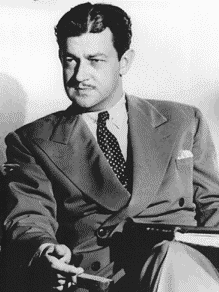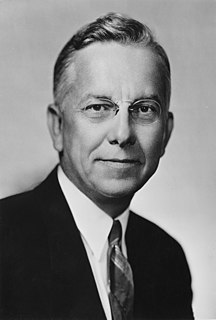A Quote by Henry Hazlitt
There is a strange idea aboard, held by all monetary cranks, that credit is something a banker gives to a man. Credit, on the contrary, is something a man already has. He has it, perhaps, because he already has marketable assets of a greater cash value than the loan for which he is asking. Or he has it because his character and past record have earned it. He brings it into the bank with him. That is why the banker makes him the loan.
Related Quotes
Reality is a state of mind. To the banker, the money in his ledger book is all very real, though he doesn't actually see it or touch it. But to the Brahma, it simply doesn't exist the way the air and the earth, pain and loss do. To him, the banker's reality is folly. To the banker, the Brahma's ideas are as inconsequential as dust.
You are angry with your neighbor, you despise him, do not like to speak peaceably and lovingly to him, because there is something harsh, abrupt, careless, unpleasant to you in his character, in his speech, in his manners-because he is more conscious of his dignity than perhaps is necessary; or because he may be somewhat proud and disrespectful; but you yourself, your neighbor's physician and teacher, are more guilty than him.
We commend a horse for his strength, and sureness of foot, and not for his rich caparisons; a greyhound for his share of heels, not for his fine collar; a hawk for her wing, not for her jesses and bells. Why, in like manner, do we not value a man for what is properly his own? He has a great train, a beautiful palace, so much credit, so many thousand pounds a year, and all these are about him, but not in him.
The responsibility which rests upon man is proportional to the ability which he possesses and the opportunity which he faces. Perhaps that responsibility is no greater for him than was that of Notharctus or Eohippus or a trilobite, each in his own day, but because of man's unique abilities it is the greatest responsibility that has ever rested upon any of the earth's offspring.
A consolidation makes sense only if you can lower your overall interest rate. Many people consolidate by taking out a home equity line loan or home equity line of credit (HELOC), refinancing a mortgage, or taking out a personal loan. They then use this cheaper debt to pay off more expensive debt, most frequently credit card loans, but also auto loans, private student loans, or other debt.
A sound banker, alas, is not one who foresees danger and avoids it, but one who, when he is ruined, is ruined in a conventional and orthodox way along with his fellows, so that no one can really blame him. It is necessarily part of the business of a banker to maintain appearances, and to confess a conventional respectability, which is more than human. Life-long practices of this kind make them the most romantic and the least realistic of men.
He is not easy to describe. There is something wrong with his appearance; something displeasing, something downright detestable. I never saw a man I so disliked, and yet I scarce know why. He must be deformed somewhere; he gives a strong feeling of deformity, although I couldn’t specify the point. He’s an extraordinary-looking man, and yet I really can name nothing out of the way. No sir; I can make no hand of it; I can’t describe him. And it’s not want of memory; for I declare I can see him this moment.
If you look at what's happened to the stock market, if you look at what's happened to housing values, if you look at what's happened to bank loan portfolios because the value of their other assets that they've already issued loans against were going down, there was a pretty good argument for trying to pass something at about this level of investment with the divisions as they were - unemployment, food stamps, and tax cuts, aid to education and healthcare, and job creation.







































